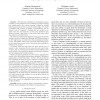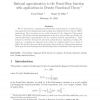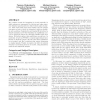24 search results - page 3 / 5 » Computational Rationalization: The Inverse Equilibrium Probl... |
125
Voted
FOCS
2009
IEEE
15 years 8 months ago
2009
IEEE
— We study the complexity of rationalizing network formation. In this problem we fix an underlying model describing how selfish parties (the vertices) produce a graph by making...
204
Voted
NA
2011
14 years 8 months ago
2011
We are interested in computing the Fermi-Dirac matrix function in which the matrix argument is the Hamiltonian matrix arising from Density Function Theory (DFT) applications. More...
SIGECOM
2009
ACM
15 years 8 months ago
2009
ACM
We consider models for bargaining in social networks, in which players are represented by vertices and edges represent bilateral opportunities for deals between pairs of players. ...
110
click to vote
SODA
2004
ACM
15 years 3 months ago
2004
ACM
We study algorithmic questions concerning a basic microeconomic congestion game in which there is a single provider that offers a service to a set of potential customers. Each cus...
112
click to vote
FUIN
2010
15 years 11 days ago
2010
Abstract. A (combinatorial) channel consists of pairs of words representing all possible inputoutput channel situations. In a past paper, we formalized the intuitive concept of “...



